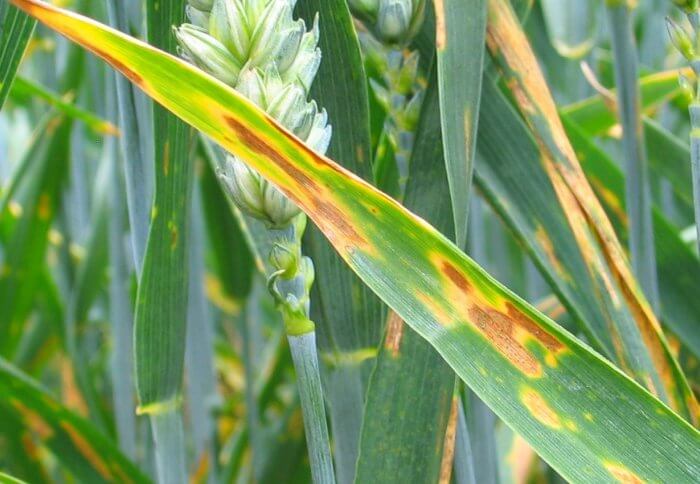
Plant diseases in farms and gardens can be triggered by multiple elements including fungi, bacteria, viruses, and certain environmental conditions. Such diseases can inflict substantial harm on crops and diminish yield.
Here are diseases that commonly afflict farm and garden plants, examining the specific plants they affect, the harm they induce, and the array of treatment options, both natural and chemical.
Powdery mildew, a fungal affliction, impacts an extensive variety of plants, encompassing cucumbers, squash, roses, and strawberries. It appears as a white, powdery coating on plant leaves, stems, and flowers, and can cause the plant to become weakened and stunted. A natural remedy for combating powdery mildew involves spraying the affected plant with a concoction of water and baking soda. Chemical treatments include fungicides containing sulfur, copper, or potassium bicarbonate.
Powdery mildew, a fungal affliction, impacts an extensive variety of plants, encompassing cucumbers, squash, roses, and strawberries. It appears as a white, powdery coating on plant leaves, stems, and flowers, and can cause the plant to become weakened and stunted. A natural remedy for combating powdery mildew involves spraying the affected plant with a concoction of water and baking soda. Chemical treatments include fungicides containing sulfur, copper, or potassium bicarbonate.
Blight is a type of fungal affliction that impacts a wide range of crops, including, tomatoes, potatoes, and sweet peppers. It causes the leaves to turn brown, wilt, and die. Blight can also affect the fruit of the plant, causing it to rot. One natural treatment for blight is to remove the infected plant material and avoid overwatering. Chemical treatments include fungicides containing chlorothalonil or copper.
Blight is a type of fungal affliction that impacts a wide range of crops, including, tomatoes, potatoes, and sweet peppers. It causes the leaves to turn brown, wilt, and die. Blight can also affect the fruit of the plant, causing it to rot. One natural treatment for blight is to remove the infected plant material and avoid overwatering. Chemical treatments include fungicides containing copper or chlorothalonil.

Black spot is a fungal disease that affects roses and can cause significant damage to the plant. It appears as black spots on the leaves and can cause the plant to become weakened and lose its leaves. One natural treatment for black spot is to remove the infected leaves and spray the plant with a mixture of water and neem oil. Chemical treatments include fungicides containing chlorothalonil or tebuconazole.
Bacterial canker is a disease that affects tomatoes, peppers, and other crops. It causes the leaves to turn yellow and wilt and can cause the fruit to rot. One natural treatment for bacterial canker is to remove infected plant material and avoid overwatering. Chemical treatments include copper-based fungicides.
Leaf spot is a fungal disease that affects many crops, including beans, peas, and tomatoes. It causes dark spots on the leaves and can cause the plant to become weakened and lose its leaves. One natural treatment for leaf spot is to remove infected plant material and avoid overwatering. Chemical treatments include fungicides containing chlorothalonil or copper.
Root rot is a prevalent fungal ailment that impacts a wide range of crops, encompassing tomatoes, pepper plants, and cucumbers. It causes the roots to become brown and mushy, which can lead to the plant becoming weakened and stunted. One natural treatment for root rot is to avoid overwatering and improve soil drainage. Chemical treatments include fungicides containing thiophanate-methyl or propiconazole.
Farm and garden plant diseases can cause damage to crops and significantly reduce yield. By understanding the plants and diseases that are common in your region and implementing preventive measures, you can protect your crops and maximize your yield. Some ways to prevent the spread of diseases include crop rotation, proper watering techniques, and removing infected plant material.
In managing various plant diseases, including natural treatments like pruning, neem oil sprays, and baking soda solutions have proven to be effective. However, certain situations may require the use of chemical treatments, and it is crucial to select the suitable treatment that aligns with the specific disease and crop under treatment. Maintaining healthy and disease-resistant crops is key to preventing and managing plant diseases in your farm or garden.
Ready to transform your land into a high-yield, sustainable farm? Let Crop Circle Farms design and build a custom, low-impact, and water-efficient farm tailored to your needs. Double your income and cut your costs in half! Contact Us
Help us expand our mission to revolutionize agriculture globally. We are seeking partners to implement Crop Circle Farms to feed people in need. Together, we can build scalable food production systems that save water, reduce costs, and feed thousands of people. Contact Growing To Give